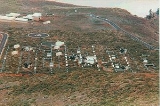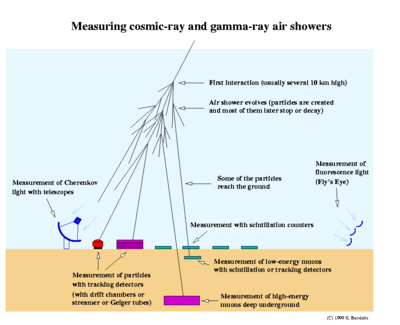
HEGRA
Encyclopedia
- This article is about the physics experiment. For other meanings, see Hegra (disambiguation)Hegra (disambiguation)-Places:*Hegra, a village in the municipality of Stjørdal in Nord-Trøndelag county, Norway*Hegra, an ancient Nabatean city , now called Mada'in Saleh...


Gamma-ray astronomy
Gamma-ray astronomy is the astronomical study of the cosmos with gamma rays. Gamma-rays are the most energetic form of "light" that travel across the universe, and gamma-rays thus have the smallest wavelength of any wave in the electromagnetic spectrum.Gamma-rays are created by celestial events...
. With its various types of detectors, HEGRA took data between 1987 and 2002, at which point it was dismantled in order to build its successor, MAGIC
MAGIC (telescope)
MAGIC is a system of two Imaging Atmospheric Cherenkov telescopes situated at the Roque de los Muchachos Observatory on La Palma, one of the Canary Islands, at about 2200 m above sea level...
, at the same site.
It was located at Roque de los Muchachos Observatory
Roque de los Muchachos Observatory
Roque de los Muchachos Observatory is an astronomical observatory located in the municipality of Garafía on the island of La Palma in the Canary Islands...
on La Palma
La Palma
La Palma is the most north-westerly of the Canary Islands. La Palma has an area of 706 km2 making it the fifth largest of the seven main Canary Islands...
at a height of 2200 m above sea level. It was operated by an international collaboration of research institutes and universities, such as the Max Planck Institute for Physics in Munich, the Universidad Complutense de Madrid, the German Max Planck Institute for Nuclear Physics
Max Planck Institute for Nuclear Physics
The Max-Planck-Institut für Kernphysik is aresearch institute in Heidelberg, Germany.The institute is one of the 80 institutes of the Max-Planck-Gesellschaft , an independent, non-profit research organization. The Max Planck Institute for Nuclear Physics has been founded in 1958 under the...
, the University of Wuppertal
University of Wuppertal
The University of Wuppertal is a German scientific institution, located in Wuppertal, North Rhine-Westphalia.The university, the full German name of which is Bergische Universität Wuppertal , was formed in 1972 and is located in the city of Wuppertal, within the state of North Rhine-Westphalia,...
, the IFKKI in Kiel or the University of Hamburg
University of Hamburg
The University of Hamburg is a university in Hamburg, Germany. It was founded on 28 March 1919 by Wilhelm Stern and others. It grew out of the previous Allgemeines Vorlesungswesen and the Kolonialinstitut as well as the Akademisches Gymnasium. There are around 38,000 students as of the start of...
. It consisted of several detector types for observing secondary particles from particle cascades
Air shower (physics)
An air shower is an extensive cascade of ionized particles and electromagnetic radiation produced in the atmosphere when a primary cosmic ray enters the atmosphere...
in the atmosphere. The particle cascardes detected by HEGRA were produced by cosmic ray particles in the energy range of 1012eV to 1016eV.
The detectors with the lowest energy threshold were the atmospheric Cherenkov telescopes with "cameras" of photomultiplier tubes. They were sensitive to showers above 1012eV (1 TeV) but had to look towards possible sources and could be operated only during clear, moonless nights. They detected Cherenkov light from relativistic secondary particles in the air showers. The field of view was about 4.6°. There were a total of six of these telescopes in operation. They were dismantled in September 2002.

The first detector type of HEGRA was the array of 1 m² scintillation counters which were used to measure the numbers and arrival times of secondary particles in air showers arriving at ground level. More than 250 of these
counters were in operation, spread over a 180-by-180 m² area. These detectors were operated day and night at any weather. The energy threshold of the scintillator array was between 40 and 100 TeV, depending on the kind of primary cosmic ray particle. The scintillator array has been dismantled as well.
The scintillator array was sensitive to all types of charged secondary particles. To be able to select secondary muons in air showers there were the Muon 'Towers' with 16 m² area each. Seventeen of these detectors were installed on La Palma.
There were two more types of detectors at the HEGRA site: the CRT (Cosmic Ray Tracking)http://www.mpi-hd.mpg.de/hfm/CRT/CRT.html and the CLUE (Cherenkov Light Ultraviolet Experiment)http://www.pi.infn.it/clue/.

TEV
TEV may refer to:* TeV, or teraelectronvolt, a measure of energy* Total Enterprise Value, a financial measure* Total Economic Value, an economic measure* Tobacco etch virus, a plant pathogenic virus of the family Potyviridae....
, originating from Markarian 501 (Mrk 501).
It was shut down in 2002 in order to build the follow-up telescope MAGIC
MAGIC (telescope)
MAGIC is a system of two Imaging Atmospheric Cherenkov telescopes situated at the Roque de los Muchachos Observatory on La Palma, one of the Canary Islands, at about 2200 m above sea level...
at the same site. A direct successor to the stereoscopic system of Cherenkov telescopes is the HESS
Hess
Hess or Heß may refer to:* People with the surname Hess * Hess Educational Organization, the largest private provider of English instruction in the Republic of China...
experiment.

